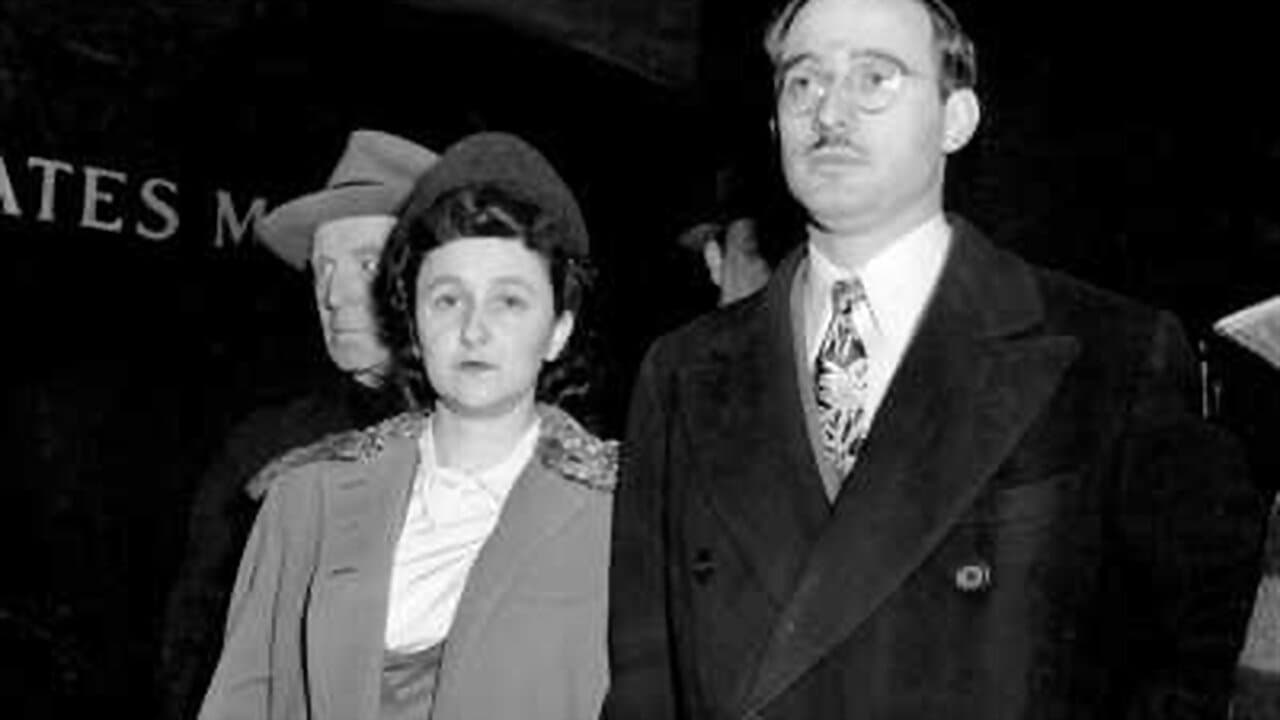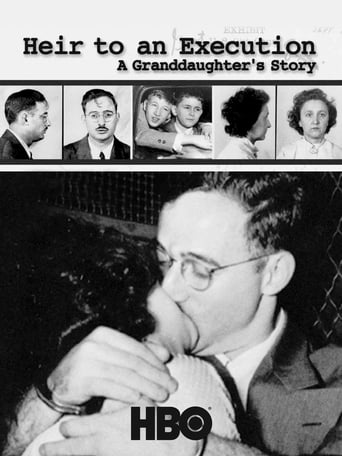



That was an excellent one.
Just perfect...
Best movie ever!
A Brilliant Conflict
I'm not sure how any of the other reviews were 10, 9, 8, 7, 6, etc. "A sophomoric attempt at film-making" Amen!!! This is truly one of the worse documentaries. Not only are the facts inaccurate, distorted, and omitted, but also the credibility of the witnesses ivy meerpool interviews leaves viewers who were unsure of the Rosenbergs certain of their guilt. In short, no credibility. Especially the over reaching grand daughters with scenes of hyperbolic emotion. Growing up with biased and hearsay. Even Meerpools methods as a pseudo journalist with follow- up questions was baffling. Meerpool makes the assumption that everyone knows the story, which with this case, she shouldn't have--filmmaking 101, Journalism 101. Attempting to persuade the audience emotionally and with "evidence" that her grandparents were wrongly convicted, as a rhetorician I would use this film as a failing attempt and untrustworthy.
View MoreIt is a shame and sadness that the Rosenberg family had to live in the shadow of Julius and Ethel, the first and only two Americans executed for treason and espionage. And shows the points of view from different angles.Julius was guilty as his arrogance got to him. Ethel may have supported his ideas with the Communist party. But she was made a scapegoat in order to bring her husband down. Sadly, she ended up in the electric chair with him at Sing Sing. The FBI should had eyed David, not Ethel.Julius could had named names and spare him and his wife from the chair. And not lie and proclaim his innocence. He was guilty as charged. Ethel may have typed the notes to give to the then-USSR at the time. But she had no codename. Julius and his brother in law, with his brother in law's wife did though.Roy Cohn and Joseph McCarthy made careers out of hunting down communists. And in the end, they were overzealous and arrogant than Julius was. But very little was mentioned of them.Filmmaker Ivy Merepol, daughter of Michael Merepol shows how the family has been in shame and guilty. As neither of Julius or Ethel's families wanted to get involved. Cousins, aunts, uncles, etc. And how they were expelling Michael and brother Robert of the espionage and treason of both men's parents. When the men were oprhaned and nobody would come to take them after their parents execution. As the families were ashamed of Julius and Ethel brought onto them all.Except one cousin did talk to Ivy. As he was so ashamed of the family continuing to shun Michael and Robert, and both men's family.Michael and Robert both turned out really well in the end, as they grew up. After being adopted by a loving couple, changed their names to Merepol in order to avoid anymore hurt and pain. That both men were being caused over their parents and being orphaned for a time. Went on to both earning several degrees and being professors. It could had turned out a lot more worse for them. But in the end, after the times changed and the hoopla died down. The media and the feds as well, left them alone to live their own lives, with their careers, started their own families.Think that the real villain and main antagonists was Ethel's brother, David Greenglass and his wife Ruth. Whom both helped send Ethel to the chair. In order to save their own skin. Think that David should had been riding the lightening instead of his sister, sitting in Julius' lap when the electricity hit in the chair. Talk about heartless and cruel. And in a 2001 interview, David in a disguise in his first and only interview for CBS 60 Minutes. Has no remorse at all. And probably will never have that he sent his own sister to the chair.The documentary is informative, helpful, and shows from all kinds of angels. The ending where Ivy and Michael found the graves of Ethel and Julius were touching. But only written in plain letters with their names. Not like Ivy said, beloved mother, father, husband, wife, etc.Sure it was so bad that Julius and David Greenglass committed espionage and to a lesser extent, Ruth. And could had cost about nearly half a million peoples' murders. Like Judge Irvin Kaufman said, worse than murder. Sadly the overlooked happens to be Julius and Ethel's own children, and children's children!
View MoreI have always been fascinated by the Rosenbergs and was eager to see this film, but came away disappointed. It's a good thing I knew all about the Rosenbergs beforehand, because otherwise I would have been very confused. The film didn't give any back story on Julius and Ethel Rosenberg. Who were they? What did they (allegedly) do? How were they discovered? Why were they chosen to symbolize the witchhunt era? Why were they executed, when hundreds of other convicted spies were not? What evidence suggests they were guilty, and what evidence suggests they were not? A documentary should elucidate the viewer and make them feel more knowledgeable on a subject than before. Ivy did practically no historical research when making this film, which betrays the entire purpose of a documentary. She interviewed family members and tracked down old people who knew her grandparents, but otherwise provided no context. Someone who is not American, or unfamiliar with the McCarthyism era, would be baffled by this film, because it assumes that everyone already knows the story.It is clear that Ivy put her whole heart into this project, and the result is a very sincere attempt to humanize the grandparents she never met. However, I wanted to understand what truly happened, and my questions were not answered.The best thing about this film was Michael Meeropol, Ivy's father. He is a passionate, articulate activist who knows more about the subject than his daughter. The scenes in which he speaks were the smartest in the film. I began to wish that he had directed this documentary, and not his daughter. Ivy, despite her good intentions, is ditzy and a weak interviewer. She has the very annoying habit of trailing off questions halfway, and leaving her subjects to figure out what she is asking. Her interviews were unstructured and the narration was rickety.Furthermore, the biases and shoddy journalism are apparent. Ivy and her brother are naively insistent that their grandparents were "innocent" (a word that gets thrown around repeatedly) despite admitting that they never examined the evidence or studied the story beyond hearing it from their father. The Rosenberg records were unsealed by the government in 1995, and yet Ivy didn't bother looking at them until she made this film.Everyone has the right to know where they come from. While the Meeropol family's efforts to define their legacy are admirable, the result was a very amateurish film. It is too bad that another family member with better documentarian abilities didn't take the helm.
View MoreThe Rosenbergs are poster children for the black and white horror of what became known as the McCarthy Era, the Communist Witch Hunts, of the early '50s. Their faces, especially Ethel's, is as recognizable to us as McCarthy's himself. Ivy Meeropol, their granddaughter, grew up with an activist father who believed that his parents were, as they said repeatedly and even at their deaths in the electric chair, innocent. Her home was filled with their images, from newspaper accounts, books, and newsreel footage stills, to pieces of art created by the likes of Picasso. But this film only makes passing reference, I feel, to the fact of Ethel and Julius Rosenberg. What it does do is present us with a granddaughter's rather guileless investigation of who her family are. Her own name was changed by her father's adoption by another family since his own grandparents, aunts, and uncles--on both sides--Greenglass and Rosenberg-- would not take the two orphaned boys in. Her cousins (one of whom she meets for the first time and who weeps with shame at how his own father--Julius's brother--changed their name to Roberts and refused to even see his two nephews) are complete strangers to her. What does she find out? Does she know her grandparents better? I doubt it. She can't know why the Rosenbergs chose to die rather than betray political beliefs, friends, and their nearly religious conviction that Socialism was humankind's only hope. What she can see is what shame, fear, cowardice, infamy, and love does to a family. I think Lillian Hellman's title for her memoir of the same period names it best: Scoundrel Time. After all, the Rosenbergs' convictions and executions made Roy Cohn into a celebrity. God help us.
View More